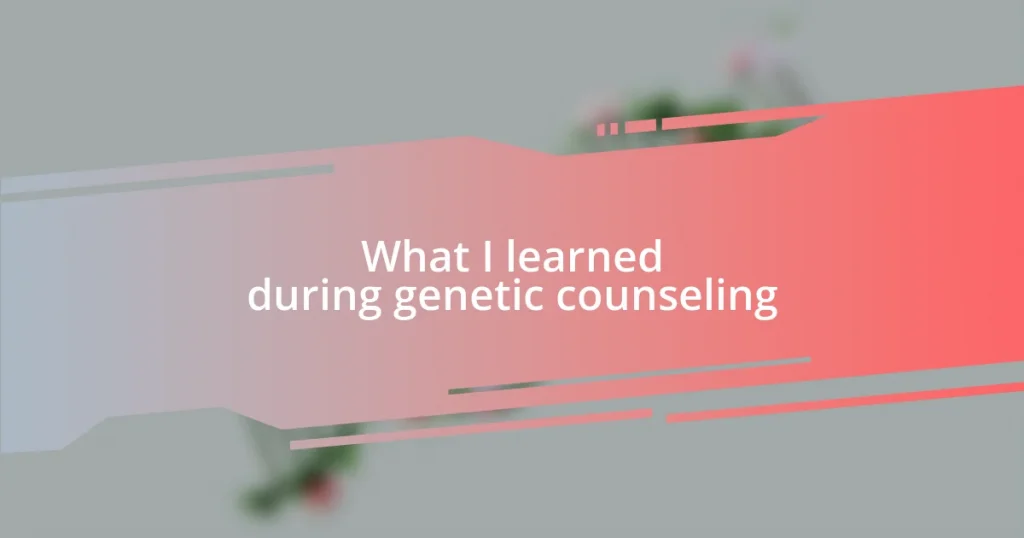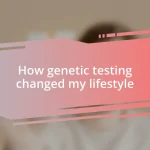Key takeaways:
- Genetic counseling combines knowledge and emotional support, guiding individuals through complex health decisions regarding genetic conditions.
- Key benefits include personalized risk assessments, informed decision-making, emotional support, family planning guidance, and resource connections.
- Understanding genetic test results involves navigating emotional responses, recognizing the uncertainty of some findings, and using insights to inform health choices and family discussions.
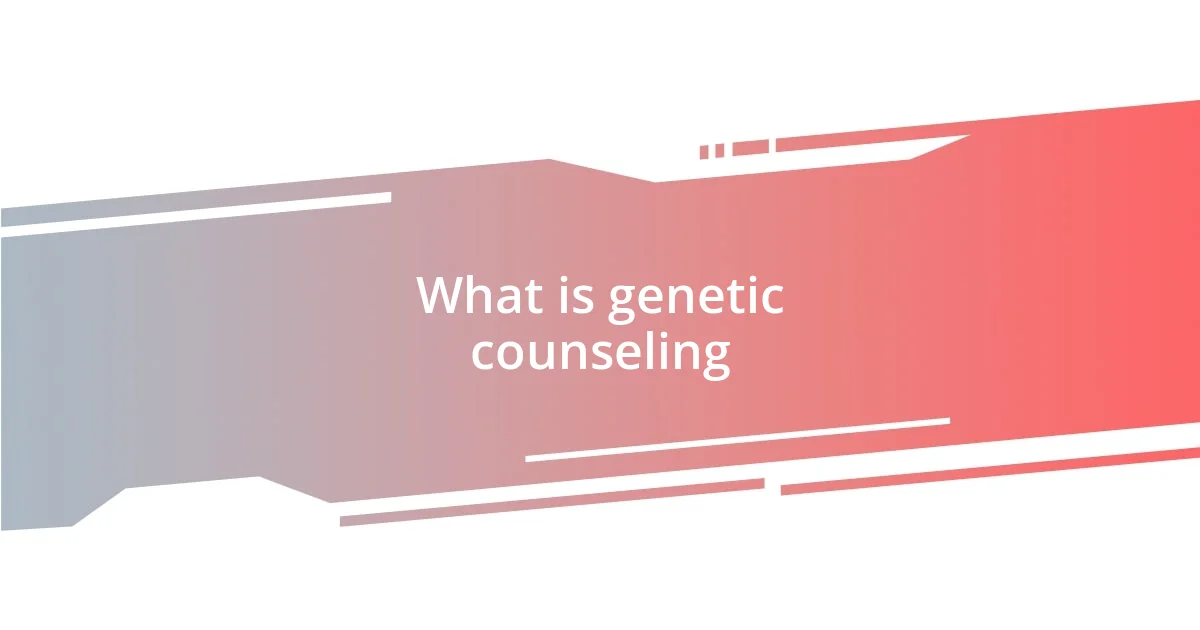
What is genetic counseling
Genetic counseling is a process where trained professionals provide information and support to individuals or families who are concerned about genetic conditions. I remember when I first learned about it – the idea of having a knowledgeable guide through the often complex world of genetics felt both comforting and empowering. Isn’t it reassuring to know that there’s someone who can help decode the specifics of genetic risks and implications?
During a genetic counseling session, counselors discuss family history, interpret test results, and help clients understand the potential impact of genetic disorders. It’s not just about receiving information; it’s also about emotional support. Have you ever faced a tough decision about your health? I found that having someone listen and validate my concerns made a world of difference, turning what could be a daunting experience into a more manageable one.
In essence, genetic counseling isn’t merely clinical; it’s a blend of science and compassion. It fosters an environment where you can ask the tough questions. What if this condition runs in my family? How will it affect my future children? Personally, my conversations with my genetic counselor allowed me to reflect deeply and made me feel more in control of my health choices. It’s this intertwining of knowledge and empathy that truly defines genetic counseling.
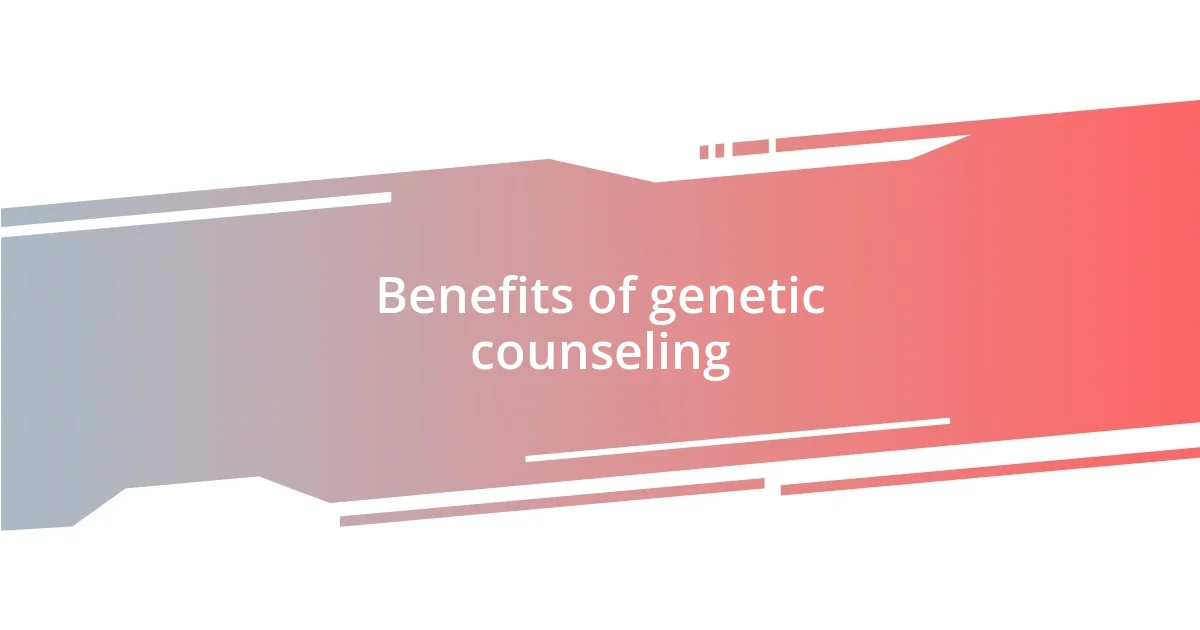
Benefits of genetic counseling
When I delve into the benefits of genetic counseling, it’s easy to see how it goes beyond just understanding genetic risks. Armed with clarity about my family history and the implications of certain conditions, I felt a powerful sense of agency over my health decisions. This process was invaluable not just for knowledge, but for the emotional resilience it provided. Knowing what to expect removed much of the anxiety I initially felt.
Here are some key benefits of genetic counseling:
- Personalized Risk Assessment: Counselors evaluate your unique family history, giving you tailored insights into your genetic risks.
- Informed Decision-Making: With a clearer understanding of your genetic health, you are better equipped to make choices about testing and preventive measures.
- Emotional Support: Beyond facts and figures, having a counselor to talk things through can significantly alleviate stress and anxiety.
- Guidance on Family Planning: For those considering having children, genetic counseling can clarify your options and potential outcomes.
- Resource Connection: Counselors often connect you with additional support groups and resources, helping navigate further medical or emotional support.
Every session felt like a breakthrough. I remember leaving one meeting feeling lighter, armed with knowledge that gave me better insight not only into my health but into the health of future generations. The sense of empowerment that comes from understanding one’s genetic landscape can truly be life-changing.
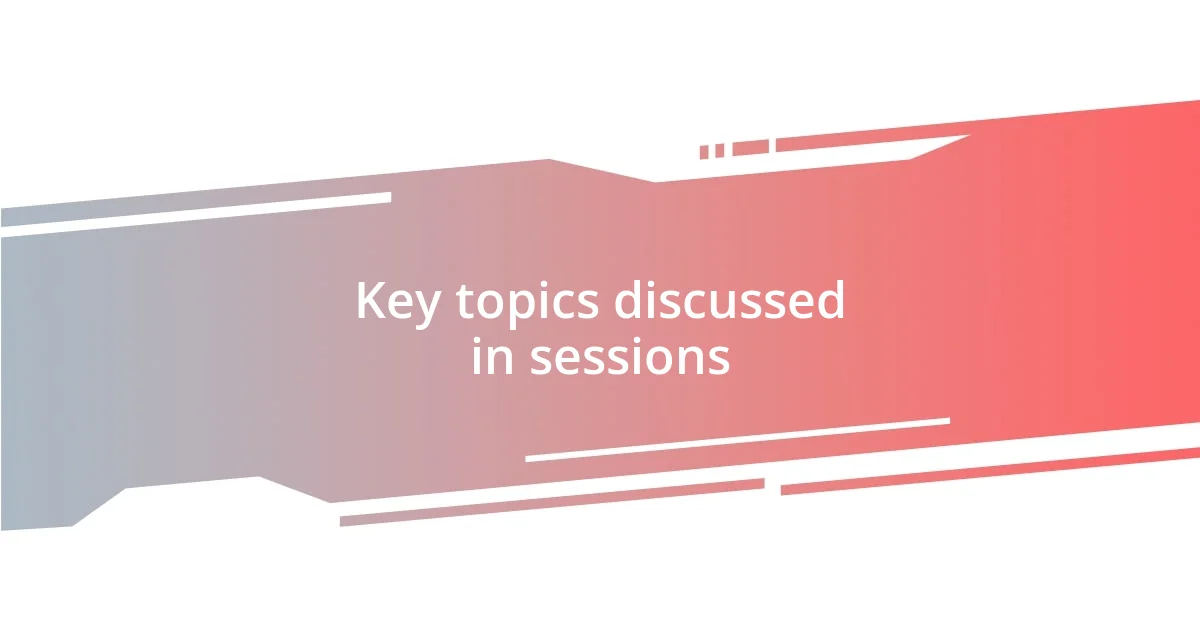
Key topics discussed in sessions
During each genetic counseling session, key topics like family history, risk assessment, and testing options take center stage. I remember one particular discussion about my family background that highlighted a pattern of certain conditions. It was eye-opening, and I felt a mix of curiosity and worry. By understanding where I stand, I could start to comprehend my own health journey.
Another essential topic revolves around the interpretation of genetic test results. I’ll never forget the day my counselor explained the implications of my results—how they painted a clearer picture of my health risks. It felt like I was piecing together a puzzle; every piece of information mattered. This deciphering process not only informed me about potential health challenges but also empowered me to take proactive measures.
Counselors also discuss emotional coping strategies, which I found incredibly beneficial. Sharing my concerns about what this information could mean for my family was cathartic. The counselor listened intently and offered insights on managing anxiety. Have you ever felt overwhelmed by information that could affect your life? For me, having that supportive discussion was pivotal in processing what I had learned, allowing me to embrace uncertainty with more confidence.
| Topic | Description |
|---|---|
| Family History | Understanding hereditary patterns that may impact your health. |
| Risk Assessment | Evaluating individual genetic risks based on family background. |
| Test Results Interpretation | Deciphering genetic test outcomes to inform health choices. |
| Emotional Support | Providing a space to address fears and concerns regarding genetic health. |
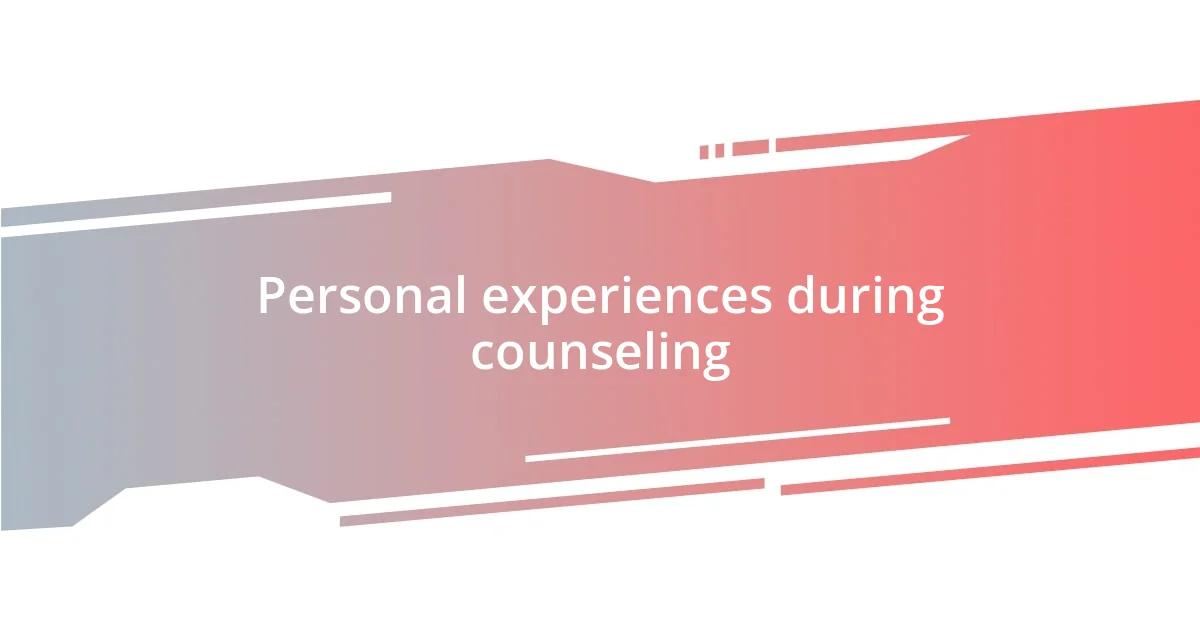
Personal experiences during counseling
During one of my sessions, I vividly recall sitting across from my counselor, who patiently guided me through my family’s medical narrative. Each revelation felt like unlocking a new door in my understanding of self. I knew I had a history of certain conditions, but hearing it laid out in a logical way stirred emotions I didn’t expect: a mix of relief and concern. Have you ever sat in a room, surrounded by facts, yet felt the weight of your family’s history pressing down on you? That was me.
I had a particularly poignant moment when discussing testing options. I remember weighing the pros and cons of undergoing a specific genetic test that could reveal considerable risks. It was emotional for me, almost as though I was deciding between a path of clarity and a path of uncertainty. I hesitated, thinking: What if the results change everything? The counselor’s reassurance helped me understand that knowledge, even if daunting, offers the power to make informed choices.
Another session stands out for its emotional support aspect. We spoke candidly about how these revelations could alter my family dynamics. I felt an overwhelming sense of vulnerability while sharing my worries about sharing results with loved ones. Yet, in that safe space, my counselor provided strategies for bringing my family into the discussion. The sense of camaraderie made me realize I wasn’t alone in this journey. Isn’t it comforting to know there’s someone in your corner, ready to support you through the emotional whirlwind?
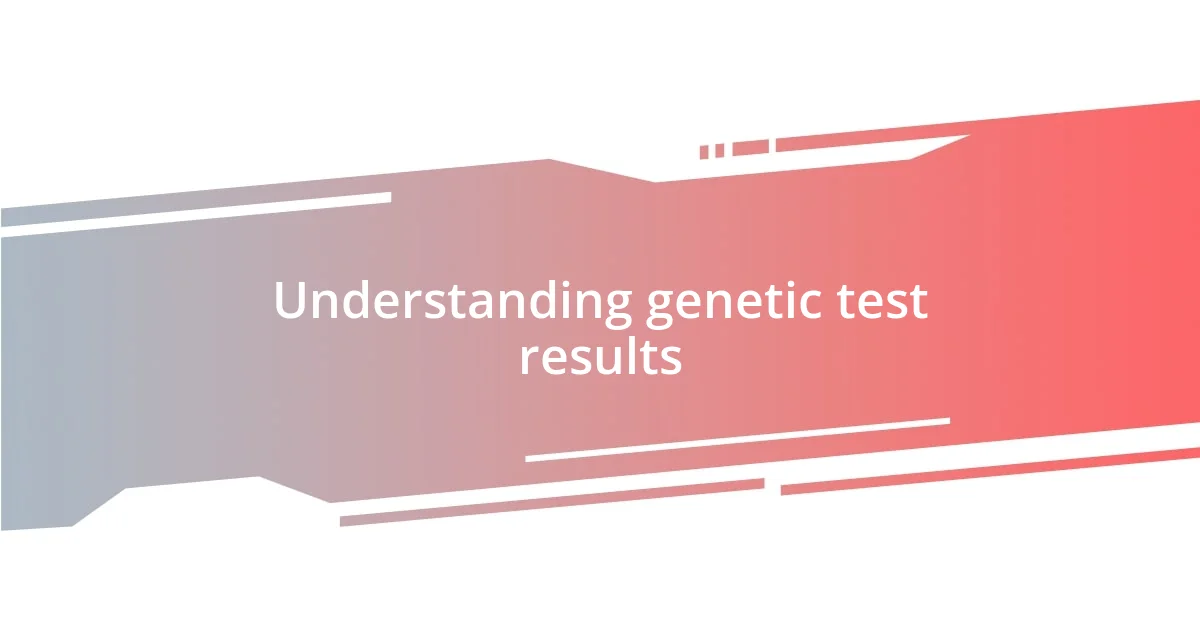
Understanding genetic test results
Understanding genetic test results can feel like navigating a complex maze. I remember the moment my counselor laid out my results in front of me, highlighting specific variants in my DNA. It was both empowering and terrifying; I thought, “What do these numbers really mean?” Each mutation had its own story, and getting to the heart of each one was crucial for understanding what risks I might face.
As I delved deeper, I was struck by the realization that not every result directly indicated a fate. Some tests showed variants of uncertain significance, leaving me pondering. I remember asking, “If there’s no clear answer, how should I respond?” My counselor explained that these inconclusive results could still inform my lifestyle choices and health screenings, allowing me to become a proactive participant in my health journey. It’s fascinating how ambiguity can sometimes lead us to greater awareness.
There’s definitely a huge emotional component to interpreting genetic results. I often reflected on how these insights could ripple through my family. Would knowing my risks prompt conversations about health history? This idea both excited and scared me. The counselor emphasized that sharing this information can be a form of empowerment, encouraging open discussions that may help not only me but my loved ones as well. Isn’t it amazing how knowledge can transform our relationships and choices?
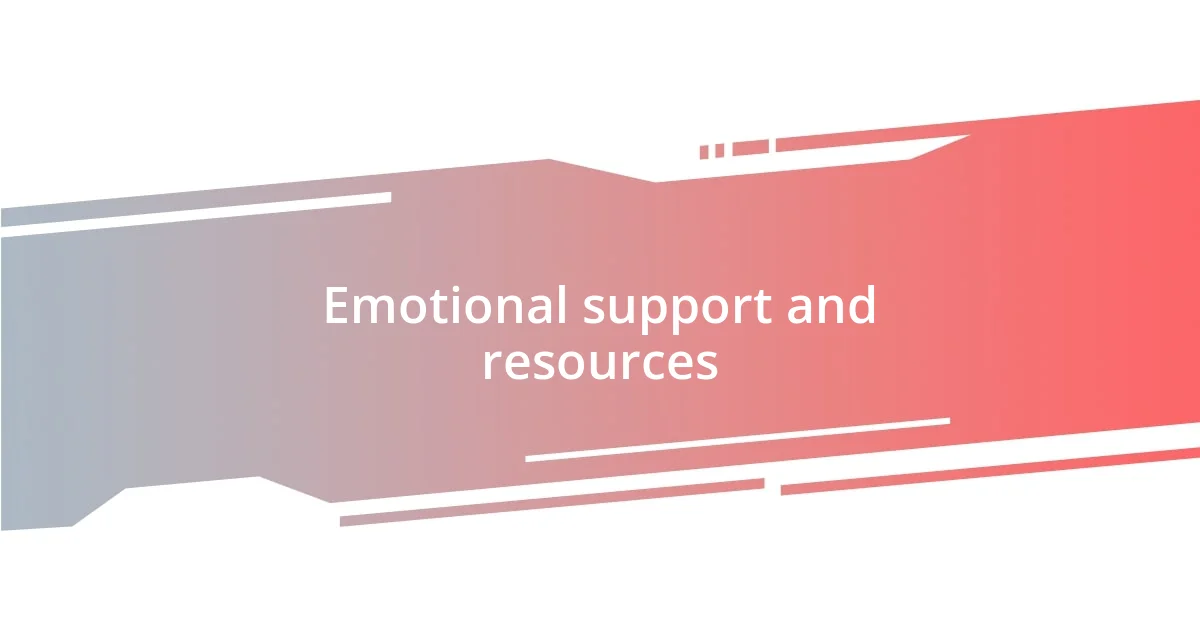
Emotional support and resources
I learned that emotional support in genetic counseling is not just about discussing results; it’s about navigating feelings that can surface throughout the process. I recall this moment when I let my guard down, sharing my fears about potential outcomes with my counselor. Their empathetic response made me realize understanding genetic risks goes hand-in-hand with addressing the emotions tied to them. Have you ever felt a veil of uncertainty lift simply by expressing your anxieties? It’s a powerful reminder that vulnerability can foster strength.
As I progressed through my sessions, I discovered numerous resources available for emotional support. There were support groups, both in-person and online, that connected me with others sharing similar journeys. I joined an online forum where I found solace in hearing stories of resilience and coping strategies. It dawned on me that I wasn’t alone in this labyrinth of feelings—how comforting is it to connect with others who truly get what you’re going through?
Moreover, my counselor introduced me to various coping techniques to manage stress and anxiety. I vividly remember practicing mindfulness exercises during our sessions, which helped ground me during particularly overwhelming moments. These resources made a difference, reinforcing that taking care of my emotional health is just as vital as understanding my genetic information. Have you ever tried an exercise that transformed your perspective? For me, it became a valuable tool in my ongoing journey, shifting my focus from fear to empowerment.










